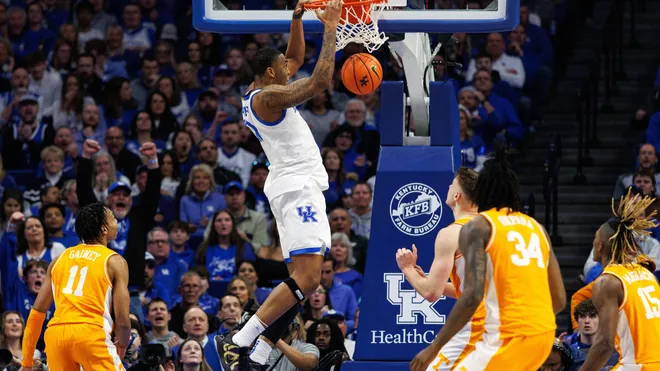Why Tennessee’s Regular-Season Losses to Kentucky Won’t Matter in the NCAA Sweet 16
The NCAA Tournament, also known as March Madness, is one of the most unpredictable sporting events in the world. Teams that dominate the regular season can find themselves eliminated early, while underdogs often rise to the occasion and defy expectations. That’s why, despite the Tennessee Volunteers being swept by the Kentucky Wildcats in the regular season, it would be a mistake to assume that Kentucky has a guaranteed edge in their upcoming Sweet 16 matchup.
March Madness Changes Everything
The biggest reason Tennessee’s previous losses to Kentucky won’t matter is that the NCAA Tournament is a completely different animal from regular-season play. The stakes are much higher, and every team is playing for survival. While regular-season matchups offer important insight into team strengths and weaknesses, the tournament environment is unique. Players who struggled earlier in the season can suddenly rise to the occasion, and coaching adjustments become even more critical.
One of the most famous examples of this unpredictability was in 2014 when Kentucky lost to Florida three times during the regular season but went further in the NCAA Tournament. March Madness is a time when teams often find another gear, and Tennessee has shown resilience throughout the season.
Tennessee Has Evolved Since the Regular Season
Basketball teams are not static entities. They evolve over the course of a season as players gain experience, coaching strategies shift, and chemistry improves. While Tennessee fell short in both regular-season meetings with Kentucky, they have had time to learn from those losses and make the necessary adjustments.
In their first matchup, Tennessee struggled with Kentucky’s transition offense, allowing the Wildcats to dictate the tempo of the game. In the rematch, Tennessee improved in that area but still had difficulty breaking through Kentucky’s perimeter defense. Now, with a chance to redeem themselves in the tournament, Tennessee can build upon those lessons and come in with a fresh game plan.
The Neutral Site Factor
Another key difference between the regular-season matchups and the Sweet 16 is the venue. Both of Tennessee’s losses to Kentucky took place in hostile environments: one in Rupp Arena and the other in Thompson-Boling Arena, where Kentucky fans traveled well. The Sweet 16, however, is played on a neutral court, where neither team has the advantage of home-court energy.
Historically, teams that struggled on the road have found success in the tournament when playing at neutral venues. Tennessee will not have to contend with Kentucky’s raucous home crowd, and that could allow them to execute their game plan with more composure and focus.
Key Players Stepping Up
One of the most compelling reasons to believe Tennessee can turn the tide against Kentucky is the emergence of key players at the right time. While the Volunteers had solid performances against Kentucky earlier in the year, they didn’t get enough production from their bench or secondary scorers.
However, since the SEC Tournament, Tennessee’s supporting cast has stepped up. Players like Jordan Gainey and Jahmai Mashack have started contributing more consistently, taking some of the scoring burden off their star players. If Tennessee can get strong performances from these emerging players, they will be in a much better position to counter Kentucky’s attack.
On the other hand, Kentucky has also relied heavily on a few key players, including Rob Dillingham and Antonio Reeves. If Tennessee can focus on disrupting Kentucky’s main offensive threats, they could force the Wildcats into an uncomfortable situation where they must rely on role players who are less experienced in high-pressure tournament games.
Coaching Adjustments Will Be Crucial
Tennessee head coach Rick Barnes is no stranger to the NCAA Tournament, and his experience could be a major factor in this matchup. While John Calipari has had great success in March Madness, Barnes has been known for his ability to make defensive adjustments that can stifle even the most potent offenses.
In their two losses to Kentucky, Tennessee struggled in transition defense and allowed too many easy baskets. Expect Barnes to emphasize a game plan that slows Kentucky down and forces them into half-court sets, where Tennessee’s defense has been much stronger. If the Volunteers can dictate the pace of play and make Kentucky work for every shot, they will have a strong chance to flip the script on their previous meetings.
The Mental Factor: Pressure on Kentucky
While Kentucky may have the confidence of having swept Tennessee in the regular season, that can sometimes be a double-edged sword. The Wildcats will enter the Sweet 16 matchup with the pressure of expectation. Having beaten Tennessee twice, there is an assumption that they should win again—but that pressure can lead to overconfidence or a tendency to play too conservatively.
Tennessee, on the other hand, enters the game with a chip on their shoulder. They know they are viewed as the underdog in this specific matchup, but that can fuel their motivation. In March Madness, teams that play with urgency and hunger often outperform those that feel comfortable.
Recent Examples of Teams Overcoming Regular-Season Sweeps
It’s important to note that teams overcoming regular-season sweeps in the NCAA Tournament is not uncommon. Just last season, Miami was swept by Duke in ACC play but managed to outplay them when it mattered most in the Elite Eight. In 2019, Michigan State had lost twice to Michigan before finally beating them in the Big Ten Tournament Championship and then going on a deep run in the NCAA Tournament.
This pattern shows that previous losses can serve as a blueprint for success rather than a predictor of continued failure. Tennessee has two full games worth of film and analysis to understand what went wrong and what they need to adjust to come out victorious in the Sweet 16.
What Tennessee Must Do to Win
For Tennessee to reverse their fortunes and defeat Kentucky, they must focus on a few key areas:
- Defensive Intensity: Tennessee must limit Kentucky’s fast-break opportunities and force them into difficult, contested shots in the half-court.
- Balanced Scoring: The Volunteers need contributions from multiple players, not just their stars, to keep Kentucky’s defense guessing.
- Rebounding Battle: Winning the rebounding battle will be crucial, especially against Kentucky’s athletic frontcourt.
- Limiting Turnovers: Tennessee must take care of the ball and avoid unforced errors that can lead to easy points for Kentucky.
- Strong Second-Half Performance: Tennessee struggled late in their previous matchups against Kentucky. They need to execute better in the final minutes to close out the game strong.



